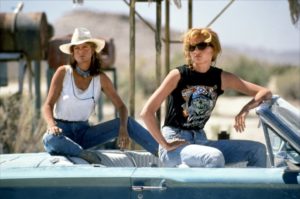Now, I had been aware of Ridley Scott as the Promethean titan of sci-fi epics. This guy’s films had burrowed into my mind long ago; I had watched “Alien,” “Blade Runner,” “Black Hawk Down,” and “Gladiator.” He struck me as a visionary who didn’t compromise on his aesthetics and craft for any amount of critical commentary on his (brilliant) filmography. Wait, this guy had made a road movie? With two females in the lead? And it’s a classic? And I haven’t watched this till now? WHY?
Louise (Susan Sarandon) is a waitress. Thelma (Geena Davis) is a housewife, troubled with her marriage to a certified a-hole. Thelma and Louise are friends. Louise takes Thelma on a trip to get a window out of their lives which have amounted to nothing so far. The plot swiftly transforms them into fugitives when they kill a rapist in a parking lot. The road from that point on is the proverbial ‘less traveled by.’ They put on their new skin like a chameleon; not to camouflage, but to inhabit a new life. The journey transcends genres as a piece of cinema and builds a little house in our memories for the characters that drive it. “Thelma & Louise” is a searching experience that also happens to be a hoard of great music and two terrific performances that stir up storms of equal shock and frolic while they’re at it. Here’s how to mix unabashed entertainment, aggressive feminist propaganda, and one hell of a crime story; then make it walk the tightrope between edgily overwrought on one side, jokingly pleasant on the other.

In the middle of everything there is an unfortunate encounter with a cowboy (Brad Pitt), a store robbery gone perfectly right, a terrified hubby, and a cop in trapped in the trunk of his car. Susan Sarandon and Geena Davis exhibit a stunning authority over their respective characters and share their humane luminescence in a way that can get you lost in memories of your best friend. Thelma is a shaky, unsure doll at first who’s afraid of going off so irresponsibly without asking her husband. Towards the end she’s a gun-toting outlaw with the raw viciousness of a seasoned criminal. The gradual turn of her character’s sense of morality and thinking sinks into a quicksand and rises up again to take a wondrous form. And Geena Davis makes that believable with no qualms. The robust Susan Sarandon is fabulous, and has as much fun with her thoughtfully scripted character as we do. Callie Khouri’s screenplay (which won the Oscar) is a heady cocktail of dazzling one-liners, jumpily delightful personages and a complex, intimate companionship that spins the rest of the elements and brings them down to its heels.
“Thelma & Louise” is as much a film about the destination as it is about the journey that takes them there. Everyone knows the risks involved and is expecting one shade of a consequence. The film doesn’t exactly ditch predictability; but the ride through these exuberant willows on the shore of death, life, friendship, deceit, frustration, and, well, boredom is built into a darling of a film. It is simple enough on the surface, but like a baker who loves his work, there is love gone into cooking it to just the right amount. No farce, no overblown story arcs: just two girls in a ’66 Thunderbird discovering that they love nothing more in the world than freedom and each other.
This movie will cure non-believers of tragedy and comedy alike. It is easy to see why the slow passing of time has failed to decay the magnificent polish of the film. Lisa Cron said, “Storytelling trumps beautiful writing. Every time.” Touché.
– by Yash Bhatia


